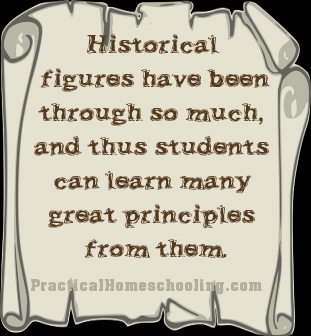 The idea that there is little or nothing to be learned from "Old Dead Guys" is a pretty ridiculous notion. In the first place, everything we have today was built on their shoulders. They labored and toiled, they investigated and invented, they suffered and died. There is so much we can learn by studying their lives, because they experienced it all: from birth to adulthood to old age to the final journey into eternity.
The idea that there is little or nothing to be learned from "Old Dead Guys" is a pretty ridiculous notion. In the first place, everything we have today was built on their shoulders. They labored and toiled, they investigated and invented, they suffered and died. There is so much we can learn by studying their lives, because they experienced it all: from birth to adulthood to old age to the final journey into eternity.
The problem today is that the young seem determined to do it themselves, to learn the hard way, and to learn as little as possible from the experiences of those who lived before them. Reading is now too much work. They'd rather watch some stupid television show with the predictable car crashes, explosions, and wretched love affairs.
But the life of the human species is a continuum, beginning with Adam and Eve, who have a lot to teach us, moving down the ages to the threshold of the twenty-first century. Just consider the works of Shakespeare. Who can deny their relevance today? How come? Because human nature has not changed. Evil is still evil. Good is still good. Love is still love. That is why Hamlet grips us, Romeo and Juliet enthrall us, Macbeth chills us.
We still get enormous pleasure from the music of such Old Dead Guys as Beethoven, Mozart, Tchaikovsky, Rachmaninoff, Gershwin, Saint-Saens, and a hundred other composers. Where would the world of music be without them? Our lives are so much richer because they lived and bequeathed to us music of such beauty that we cannot imagine life without it.
What about poetry? The sonnets of Shakespeare, the works of Longfellow, Keats, Shelley, Byron, Milton, Spencer, Dante, and Goethe. These were men who took language and wove it into thoughts, ideas, and sentiments that go to the heart of what it means to be alive, to face each day's trials and tribulations with the knowledge that we are not alone in our suffering, that the Old Dead Guys are with us, even when our contemporary peers are not.
What about all of those incredible men and women in the Holy Scripture: Noah, Abraham, Isaac, Jacob, Moses, Isaiah, Samuel, David, Solomon, Ruth, Daniel, Christ Jesus, Paul, the Apostles. How we wish we could speak to some of them, listen to them, learn from them. They left us the written word, and America would not be America if our forefathers had not brought the Holy Scripture from England to these shores. Old Dead Guys become the moral guides to the next generation, who will soon become more Old Dead Guys.
The simple truth is that everyone alive today will be dead in a hundred years. We too shall be Old Dead Guys, hoping to be remembered and read by future generations. Human nature will not change, and our generation, hopefully, will have a lot to teach future generations - if future generations are interested in learning. As the philosopher Santayana said: "Those who cannot remember the past are condemned to repeat it."
That is why I have encouraged homeschoolers to read a lot of biographies, so that they can learn from the successes and failures of human beings as they struggled through their lives. For no one should forget, that life is first and foremost, a struggle: a moral struggle, because we are all sinners; a physical struggle, because our bodies are susceptible to sickness and disease; an intellectual struggle, because it takes so much effort to learn; an economic struggle, because we have to toil in order to sustain ourselves. And we haven't even spoken of the struggles parents have, raising children, providing food for the table, building for the future.
And there is the political struggle. Trying to maintain a free country has now become the struggle of present and future Americans. Will America still be a free country fifty or a hundred years from now? The homeschool movement is an active participant in that struggle. What can homeschoolers learn from the Old Dead Guys who fought for freedom and gave us this great country? Read their biographies. Let them tell you what it was like to fight a war for freedom and what it required of them in blood, sweat, and tears. Let them inspire you to take up the battle so that future Americans will be able to enjoy what we have enjoyed.
As Thomas Carlyle once said, "History is the essence of innumerable biographies." Or in the words of Ralph Waldo Emerson: "There is properly no history; only biography." So read biographies, as many as you can. That's the best form of education. As G.K. Chesterton put it: "Education is simply the soul of a society as it passes from one generation to another."
Yes, the souls of the Old Dead Guys have been passed down to us through our reading. The words of Washington, Jefferson, Hamilton, Franklin, and countless others should be part and parcel of our understanding. That is why homeschoolers should be doing: studying and absorbing the wisdom of the Founding Fathers. The public schools are no longer doing that, so the responsibility rests upon homeschoolers to keep those ideas alive, so that the souls of the Founding Fathers will be passed on to Americans yet unborn. That really is the sacred role of the homeschooler: to keep the faith of our forefathers alive and vibrant in the hearts and minds of future generations.